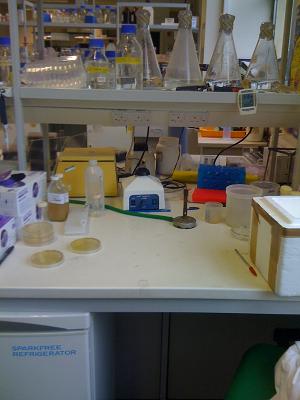Team:BCCS-Bristol/Wetlab
From 2010.igem.org
m (→Wet lab) |
|||
| Line 7: | Line 7: | ||
Our main achievement in the wet lab has been the creation of a new composite biobrick, engineering ''E. coli'' to produce GFP in response to Nitrates. Not only is this part complete, but it's also well characterised both on its own and working in tandem with a second biobrick. | Our main achievement in the wet lab has been the creation of a new composite biobrick, engineering ''E. coli'' to produce GFP in response to Nitrates. Not only is this part complete, but it's also well characterised both on its own and working in tandem with a second biobrick. | ||
| + | |||
We also developed a way of encapsulating our bacteria, allowing not only an easy and safe method of spreading them in the environment, but also dramatically improving signal detection and ''E. coli'' survival in soil. | We also developed a way of encapsulating our bacteria, allowing not only an easy and safe method of spreading them in the environment, but also dramatically improving signal detection and ''E. coli'' survival in soil. | ||
| + | |||
Finally we worked to further characterise the PyeaR promoter submitted by Edinburgh in 2009, improving the quality of information available in the parts registry. | Finally we worked to further characterise the PyeaR promoter submitted by Edinburgh in 2009, improving the quality of information available in the parts registry. | ||
| Line 14: | Line 16: | ||
In this section you can find out about the design of our parts, including all the decisions we made and why, as well as all the information relating to their construction and characterisation. It also contains material on our new encapsulation methods, and finally lists all our safety considerations both in the lab and on a wider environmental scale. | In this section you can find out about the design of our parts, including all the decisions we made and why, as well as all the information relating to their construction and characterisation. It also contains material on our new encapsulation methods, and finally lists all our safety considerations both in the lab and on a wider environmental scale. | ||
| + | |||
For a more in depth view of what we have done so far, click on the [https://2010.igem.org/Team:BCCS-Bristol/Wetlab/Notebook Notebook] section. | For a more in depth view of what we have done so far, click on the [https://2010.igem.org/Team:BCCS-Bristol/Wetlab/Notebook Notebook] section. | ||
| Line 19: | Line 22: | ||
For a complete list of the biobricks used during our project, plus a brief description on their use, click [https://2010.igem.org/Team:BCCS-Bristol/Wetlab/BioBricks here]. | For a complete list of the biobricks used during our project, plus a brief description on their use, click [https://2010.igem.org/Team:BCCS-Bristol/Wetlab/BioBricks here]. | ||
| - | |||
==Subpage Structure== | ==Subpage Structure== | ||
Revision as of 20:09, 26 October 2010
iGEM 2010
Wet lab
Our main achievement in the wet lab has been the creation of a new composite biobrick, engineering E. coli to produce GFP in response to Nitrates. Not only is this part complete, but it's also well characterised both on its own and working in tandem with a second biobrick.
We also developed a way of encapsulating our bacteria, allowing not only an easy and safe method of spreading them in the environment, but also dramatically improving signal detection and E. coli survival in soil.
Finally we worked to further characterise the PyeaR promoter submitted by Edinburgh in 2009, improving the quality of information available in the parts registry.
In this section you can find out about the design of our parts, including all the decisions we made and why, as well as all the information relating to their construction and characterisation. It also contains material on our new encapsulation methods, and finally lists all our safety considerations both in the lab and on a wider environmental scale.
For a more in depth view of what we have done so far, click on the Notebook section.
For a complete list of the biobricks used during our project, plus a brief description on their use, click here.
Subpage Structure
Team:BCCS-Bristol/Wetlab/Part_Design
Team:BCCS-Bristol/Wetlab/Beads
Team:BCCS-Bristol/Wetlab/Improvements
Team:BCCS-Bristol/Wetlab/Experiments
Team:BCCS-Bristol/Wetlab/Safety
Team:BCCS-Bristol/Wetlab/Project_Results
Team:BCCS-Bristol/Wetlab/Image_Gallery
Links to old pages
Team:BCCS-Bristol/Wetlab/Notebook
Team:BCCS-Bristol/Wetlab/BioBricks
Team:BCCS-Bristol/Wetlab/Lab_photos
 "
"
